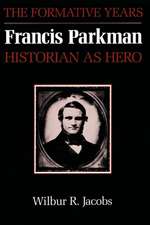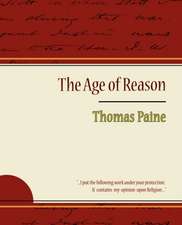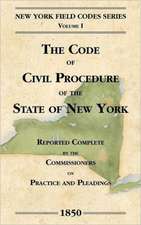The Crisis: A Work Written While with the Army of the Revolution, with a View of Stimulating That Patriotic Band to Persevere in T
Autor Thomas Paineen Limba Engleză Paperback – feb 2012
| Toate formatele și edițiile | Preț | Express |
|---|---|---|
| Paperback (4) | 89.25 lei 3-5 săpt. | |
| Prometheus Books – 31 aug 2008 | 89.25 lei 3-5 săpt. | |
| GALE ECCO SABIN AMERICANA – feb 2012 | 134.33 lei 3-5 săpt. | |
| Digireads.com – 31 dec 2009 | 93.21 lei 38-44 zile | |
| Kessinger Publishing – 21 noi 2009 | 146.32 lei 38-44 zile |
Preț: 134.33 lei
Nou
Puncte Express: 201
Preț estimativ în valută:
25.70€ • 28.01$ • 21.66£
25.70€ • 28.01$ • 21.66£
Carte disponibilă
Livrare economică 02-16 aprilie
Preluare comenzi: 021 569.72.76
Specificații
ISBN-13: 9781275724938
ISBN-10: 1275724930
Pagini: 204
Dimensiuni: 189 x 246 x 11 mm
Greutate: 0.37 kg
Editura: GALE ECCO SABIN AMERICANA
ISBN-10: 1275724930
Pagini: 204
Dimensiuni: 189 x 246 x 11 mm
Greutate: 0.37 kg
Editura: GALE ECCO SABIN AMERICANA
Notă biografică
Thomas Paine (born Thomas Pain[1]) (February 9, 1737 [O.S. January 29, 1736]- June 8, 1809) was an English-born American political activist, philosopher, political theorist, and revolutionary. He authored the two most influential pamphlets at the start of the American Revolution and inspired the patriots in 1776 to declare independence from Great Britain.[2] His ideas reflected Enlightenment-era ideals of transnational human rights.[3] Historian Saul K. Padover described him as "a corsetmaker by trade, a journalist by profession, and a propagandist by inclination".[4]
Born in Thetford in the English county of Norfolk, Paine migrated to the British American colonies in 1774 with the help of Benjamin Franklin, arriving just in time to participate in the American Revolution. Virtually every rebel read (or listened to a reading of) his powerful pamphlet Common Sense (1776), proportionally the all-time best-selling[5][6] American title, which catalysed the rebellious demand for independence from Great Britain. His The American Crisis (1776-1783) was a pro-revolutionary pamphlet series. Common Sense was so influential that John Adams said: "Without the pen of the author of Common Sense, the sword of Washington would have been raised in vain".[7] Paine lived in France for most of the 1790s, becoming deeply involved in the French Revolution. He wrote Rights of Man (1791), in part a defense of the French Revolution against its critics. His attacks on Anglo-Irish conservative writer Edmund Burke led to a trial and conviction in absentia in England in 1792 for the crime of seditious libel.
The British government of William Pitt the Younger, worried by the possibility that the French Revolution might spread to England, had begun suppressing works that espoused radical philosophies. Paine's work, which advocated the right of the people to overthrow their government, was duly targeted, with a writ for his arrest issued in early 1792. Paine fled to France in September where, despite not being able to speak French, he was quickly elected to the French National Convention. The Girondists regarded him as an ally. Consequently, the Montagnards, especially Maximilien Robespierre, regarded him as an enemy.
In December 1793, he was arrested and was taken to Luxembourg Prison in Paris. While in prison, he continued to work on The Age of Reason (1793-1794). James Monroe, a future President of the United States, used his diplomatic connections to get Paine released in November 1794. Paine became notorious because of his pamphlets. The Age of Reason, in which he advocated deism, promoted reason and free thought and argued against institutionalized religion in general and Christian doctrine in particular. He published the pamphlet Agrarian Justice (1797), discussing the origins of property and introduced the concept of a guaranteed minimum income through a one-time inheritance tax on landowners. In 1802, he returned to the U.S. When he died on June 8, 1809 only six people attended his funeral as he had been ostracized for his ridicule of Christianity














